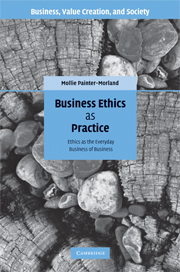Book contents
- Frontmatter
- Contents
- List of tables
- Preface
- Foreword
- Acknowledgements
- 1 Introduction: the dissociation of ethics from practice
- 2 Reconsidering approaches to moral reasoning
- 3 Moral agency reconsidered
- 4 Reconsidering values
- 5 Leadership and accountability
- 6 Reconsidering ethics management
- Index
- References
1 - Introduction: the dissociation of ethics from practice
Published online by Cambridge University Press: 22 September 2009
- Frontmatter
- Contents
- List of tables
- Preface
- Foreword
- Acknowledgements
- 1 Introduction: the dissociation of ethics from practice
- 2 Reconsidering approaches to moral reasoning
- 3 Moral agency reconsidered
- 4 Reconsidering values
- 5 Leadership and accountability
- 6 Reconsidering ethics management
- Index
- References
Summary
Ethics talk has never been more prevalent than in the first few years of the twenty-first century. Corporate scandals have shaken the international business community over the last few years and seem to have reanimated many people's interest in ethics. As a result, codes of conduct, ethics management programs and ethics offices are being created with breathless haste. Even skeptical corporate executives are beginning to acknowledge that there may be more to ethics than “motherhood and apple pie.” Many have even come around to the idea that ethics is something that has to be institutionalized, resourced and managed. To the extent therefore that they are interested in keeping their organizations out of trouble and limiting their potential liabilities, these “upright” captains of industry now stand ready to invest time, effort and money in the promotion of ethics. In the face of this wave of unprecedented interest, many business ethicists have concluded that the business community no longer sees business ethics as an oxymoron. In fact, an investment in business ethics has become a prerequisite for an organization's continued participation in formal business networks.
Given these conditions, one would expect this to be a good time to be a business ethicist. In some respects, however, it is both the best of times and the worst of times. It is the best of times in that business ethics and corporate governance are becoming standard features in both tertiary curricula and corporate training budgets.
- Type
- Chapter
- Information
- Business Ethics as PracticeEthics as the Everyday Business of Business, pp. 1 - 49Publisher: Cambridge University PressPrint publication year: 2008

